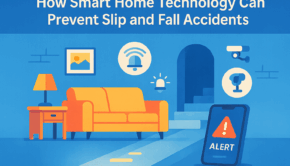Benefits Of Smart Home Technology For Seniors Aging In Place
There are several reasons why aging in place at home is so appealing to seniors. Our homes are often a big source of comfort, joy, and familiarity. And with the right technology, can also grant those 50 and up more independence as they age.
While technology and seniors might seem like two opposing forces, recent surveys show that not only is smart home technology growing at a rapid pace, but those aged 50 and older are keeping up with these changes. The Baby Boomer generation may have not grown up with Amazon’s Alexa on their countertops or smartphones in their pockets, but for many, they’re putting helpful features such as voice control and online grocery shopping to good use.
As we age, our lifestyles and needs often change due to new risks and challenges. With technology, it has become a lot easier for senior homeowners to fill in any missing gaps. However, with so many options on the market these days, it can be tricky figuring out what kind of smart technology is best and how seniors can go about implementing it into their homes. Whether a senior’s child or family lives far away or if a senior lives in a rural area, there is likely a smart home safety option available to make life at home easier and safer.

Image source: Unsplash
Time to Upgrade
Home maintenance and personal safety are two areas where seniors aging in place often need the most help. While discussing the top 10 smart home technologies for seniors, experts note some devices that are worthwhile investments. A few they list include:
- Smart smoke and carbon monoxide detectors: Smart detectors can be lifesaving. Unlike your average smoke and carbon monoxide detector, these devices can tell homeowners exactly where the problem is, send alerts to family members, and can even test themselves (which is helpful for those forgetful minds).
- Smart outlets and plugs: The right smart outlets and plugs can be utilized in almost every area of the home and can assist seniors with things such as their kitchen appliances and lights.
- Water and mold monitoring sensors: Similar to smoke and carbon monoxide detectors, smart water and mold sensors can help locate water intrusion and even harmful mold hiding in a senior’s home.
Investing in certain smart devices can help maintain the safety and security of a home, which is important for those aging in place. It’s also helpful to have one less thing to worry about, especially as age makes it easier to forget things like turning off the lights or locking the door behind you.
It Doesn’t Have to be Complicated
Of course, technology might be off-putting to some mature homeowners. Smart home tech can feel a bit too advanced, particularly when it comes to installation. However, having the right tools for the job can make the whole process much easier.
Various smart home devices, such as a smart doorbell, can seem like a hassle to install, but these days many only require a simple screwdriver and anchoring screws. Smart locks can be attached to the already existing plate and outer cylinder on your door. There are even devices, such as smart security cameras, that are a snap to install without the use of tools.
It’s also worth noting that there is usually customer support to help with navigating smart home devices if you’re not well-versed in wiring and configuring devices. Try looking into a few smart home beginner guides or contact the smart tech company directly to see if they have options for installation and user help. A lot of smart home devices can operate themselves after being installed, which makes them especially useful for those less tech-savvy seniors.
Peace of Mind
The benefits of smart home technology don’t end with better home maintenance and security either. For seniors who have reached the age of eligibility for Medicare, advancements in smart home technology can help provide better access to essential Telehealth options. This is especially important considering the current circumstances with COVID-19 and the restrictions now placed on healthcare facilities all across the nation.
In place of regular doctor visits, which can put those over 50 at risk, seniors can plug into a device and share important health information, set up virtual meetings, and provide updates to their trust medical professional. Additionally, smart home technology can help seniors by monitoring for falls in the house.
According to the National Council on Aging (NCOA), falls are the leading cause of injuries for seniors, which can greatly impact their independence. Smart technology can fill in these missing gaps, particularly for seniors who live alone, by providing safety monitoring. Devices will not only monitor for falls but can get a fallen senior help fast by automatically contacting emergency services to provide an ambulance. With technology and healthcare services synced up, aging in place is a viable, safe, and reliable option.
Technology can make the lives of our senior population not only easier but make the possibility of aging in place a realistic one. There many affordable, easy-to-install devices that can make every day a lot easier for mature homeowners and enrich their new lifestyle.
















